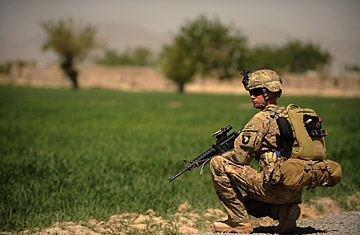
A U.S. soldier from the 101st Airborne Division stands guard in the village of Tarok Kalache, in Afghanistan's southern Kandahar province, on April 1, 2011
(2 of 2)
While Kandahar city and Malajat are key areas for the province's security, the Arghandab River Valley is arguably the most important and hotly contested area in Kandahar. The mouth of the Arghandab River Valley, which makes up the western gate of Kandahar city, is a vortex where insurgents go south from Pakistan through Shah Wali Kot and north from the province's Panjwai district. Just before, Crazyhorse Company 1-66 Armor Battalion took control of the area where the previous unit had lost three soldiers in their last mission. The Crazyhorse troops have found dozens of caches and over 100 IEDs, and they now feel that they are in control.
The most important work preparing for the upcoming fighting season can be seen in Crazyhorse's command post. The troops spent months documenting who lives where, down to the individual house. A large, multicolored map details the crops that are supposed to be planted in each field. If unknown people begin showing up in the area or if a farmer begins planting something different, the troops will investigate with their Afghan army counterparts.
After leaving the Crazyhorse command post, Colonel Martindale took me deep into the Arghdandab River Valley to the area patrolled by the 1-320 Field Artillery, a battalion from the 101st Airborne Division attached to the Raider brigade. The troops of 1-320 pushed into areas under Taliban control, fighting in summer vegetation so thick they could barely see a few meters in front of them.
Lieut. Colonel David Flynn, a Boston native with a shaved head and piercing gaze, walked me through the unit's operations in the summer and fall. During assaults in June and early October, 1-320 suffered seven soldiers killed and over 80 wounded, the majority losing limbs to IED blasts. "It was the most complex and sophisticated IED network I've ever seen," Flynn said, describing the fighting in which his troops ran into an IED every 60 m. On Oct. 6, Flynn's troops raided a village called Tarok Kalache to clear out the Taliban. They found that the Taliban had pushed out the civilians and rigged the buildings and roads with dozens of mines, IEDs, homemade explosives and booby traps. Flynn approved an air strike that leveled the entire village rather than risk a potentially catastrophic operation to retake the area. During the fight to oust the Taliban, 1-320 would bomb three such villages, controversial decisions that Flynn defended himself in a guest blog post for Foreign Policy.
After gaining an initial foothold, Flynn pushed his troops out into 17 outposts and began to rebuild the destroyed villages. The first order of business was rebuilding each village's mosque and encouraging the residents to return home. Maintaining the winter's progress with the inevitable return of the Taliban will be a tough challenge. During the winter, the Raider brigade's troops worked simultaneously to secure the residents of Kandahar and to convince them that security was possible. That challenge will get tougher given that violence is likely to increase in the spring and summer. "We're fighting two things: the Taliban and fear in the minds of the people," Martindale says. "Up until now we've just been fighting. Now we're paying attention to that."
In addition to commanding that fight, Martindale must also maintain the different factions of the provincial government in one of Afghanistan's most complex provinces. This job became even harder after this weekend's violence in protest of the recent Koran burning in Florida, which Afghan President Hamid Karzai may have helped inflame by demanding that the U.S. apologize. Kandahar is Karzai's home, and with his support, his younger brother Ahmed Wali Karzai is serving as the chief of the Kandahar Provincial Council, perhaps the most powerful position in the provincial government. The younger Karzai is a controversial figure; for years he has denied allegations of corruption, drug trafficking and even being on the payroll of the CIA. "We're running with him as long as our interests align," Martindale says of the younger Karzai. "And where our interests don't align, that gives me the ability to influence him."
With NATO and Afghan troops now firmly set in the key areas, the biggest question is whether the Taliban will fight to retake their lost territory or take the path of least resistance and move into areas absent of coalition forces. "The Taliban are going to come back, but we're in their sanctuaries here," Flynn said. "We're too thick now. It's going to be interesting to see the game they're going to play."
